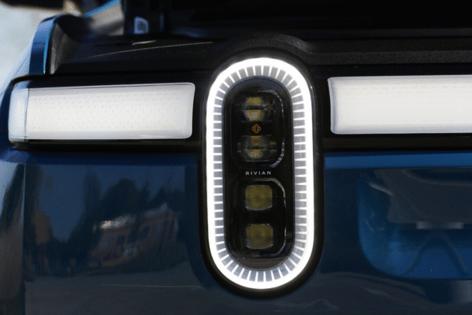Volkswagen, Rivian eye selling EV technology to other carmakers
Published in Business News
Volkswagen AG and Rivian Automotive Inc. have ambitions of selling the electric vehicle technology they’re developing together to other carmakers in the future.
The two companies’ joint venture, known as RV Tech, said it has made solid progress on delivering the EV electrical and software platform that Volkswagen needs to compete with Tesla and Chinese rivals. The JV is focused on delivering models for Rivian and VW but is keeping communication open with third parties about the scalability of its platforms.
“We’re solving a problem for the larger automotive industry,” Wassym Bensaid, Rivian’s software chief and RV Tech co-chair, told journalists at an event in Palo Alto, California, on Wednesday. “That could become an opportunity” for others as well, he said.
The platform is designed to be scalable across vehicle sizes and segments in Western markets.
The earning potential from licensing the technology “is a very different ballgame,” Bensaid said, “and a very different margin profile from a business standpoint than making cars.”
RV Tech also said it will begin testing the system in winter conditions on Audi, VW and Scout models starting in the first quarter of 2026.
Volkswagen has licensed its technology to other carmakers in the past, with Ford Motor Co. and Mahindra & Mahindra using the German carmaker’s first-generation platform for their own electric models.
Volkswagen is grappling with tariffs in the U.S., shrinking deliveries in China and muted demand in Europe. As part of its push to cut costs and bolster sales, it’s turning to Rivian for the kind of software and EV technology its initial battery-powered models were missing. The automaker is investing as much as $5.8 billion into the alliance, making it one of Chief Executive Officer Oliver Blume’s biggest strategic bets.
The partners formed a joint venture one year ago that brings together software developers and engineers from both companies. They’re working with Rivian’s centralized electronics layout with fewer computing units that’s meant to help Volkswagen simplify development and cut costs. For loss-making Rivian, the investment is a financial lifeline as manufacturers rethink strategies in a slowing EV market.
While the JV is prioritizing the ramp-up and delivery of the underpinnings for electric models, there are parallels that would allow the technology to be used for combustion engine cars as well, JV co-chair Carsten Helbing said.
The first car to get the new technology will be Rivian’s R2 sport utility vehicle, out early next year. VW’s compact EV, called ID. EVERY1, expected to cost around €20,000 (about $23,000), will follow in 2027, with rugged vehicles from the Scout brand due after that. Volkswagen has a similar partnership with Xpeng Inc. for the Chinese market.
Volkswagen’s earlier efforts to develop software in-house largely stumbled, first by holding up launches of its namesake brand’s ID models, then by handicapping those vehicles’ sales because of buggy features. The group, which also includes Audi and Porsche AG, has seen EV sales rise in Europe this year after improving software and updating models.
©2025 Bloomberg L.P. Visit bloomberg.com. Distributed by Tribune Content Agency, LLC.












Comments